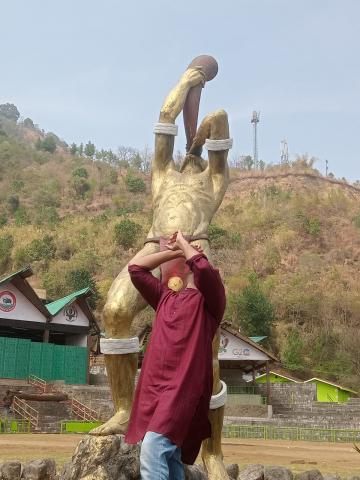
Learning from Nagaland: Reimagining Development and Rediscovering Our Roots
This was my first intense exposure to a tribal culture. Over the last six days, I had the opportunity to explore and engage with the educational and cultural landscape of Nagaland. While traveling from Kohima to Khonoma, our bus passed through the lush, green Himalayan mountains. The dense forest outside the window appeared to be untouched by human interference, and I found myself constantly gazing at its serene beauty. It felt as if there was a deep connection between the forest and me, and when I departed from it, I felt as if I was leaving a loved one behind.
This feeling of belonging to nature is a common experience for many of us. When we encounter natural surroundings, such as a riverbank or a dense forest, it often feels as if we are connected to these places and have a deep urge to return to them.
Anthropologists and neuroscientists are now discovering that humans have a profound connection with their ancestors. Our species, Homo sapiens, appeared around 300,000 years ago, and the developmental history of humans takes us back millions of years. Our modern civilized life, which has developed over the last few hundred years, is a mere blip in this history. Developmental scientists explain that our neurological structure was significantly shaped through the millions of years of human development, and what we learned and developed during this time is encoded in our DNA. It significantly shapes our cognitive behaviors and responses to various situations.
The feeling that I belong in the forest may be explained by developmental psychology. In this context, the distinction between tribal and non-tribal is superficial; essentially, all humans belong to this planet and are tribal in some sense.
The approach of seeing villages and forests as underdeveloped areas can be seen as a colonial approach to development. This approach has led the world to catastrophe over the last 200 years. What tribal villages have preserved for millions of years, modern cities have not been able to preserve even for a few hundred years. In this context, we need to evaluate our modern scientific knowledge and ways of living. Of course, we cannot throw the baby out with the bathwater. Modern scientific knowledge has brought solutions to some challenges that humans face. At the same time, we must identify the underlying values that exist in our traditional societies, particularly in the context of care, concern, and the sense of collective belonging.
Borrowing ideas from David Attenborough, if we are to survive, it is the knowledge of tribal peoples that we must trust. It is their lifestyle that can save us from disaster, their connection with nature that we need to re-establish, and their sense of community that we need to cherish. For me, there was more to learn than to offer from the life and culture of our tribal brothers and sisters. I am also using this opportunity to reflect on alternative ways of living and how we can redefine our ideas of development. As David Attenborough shows in his documentary, "A Life on Our Planet," it is only through alternative ideas of development that we can possibly rescue ourselves from the disaster that we are heading towards. It was heartening to see that in Nagaland, the government, and particularly the education department, is aware of the need to protect its culture, language, community life, and tribal identity.
- Log in to post comments
